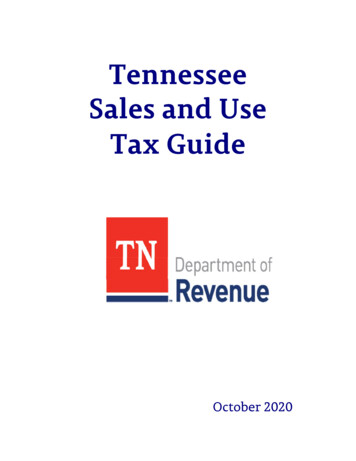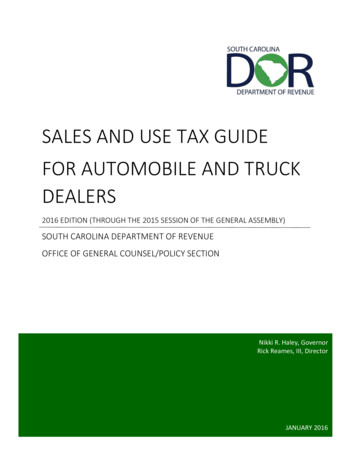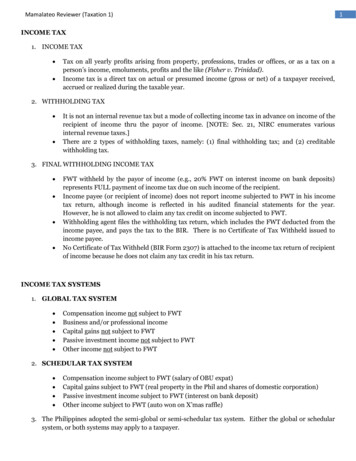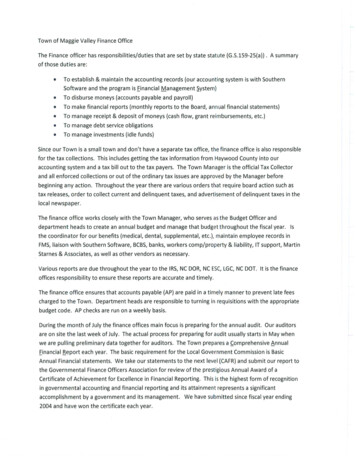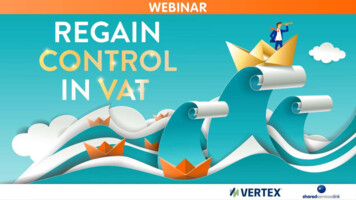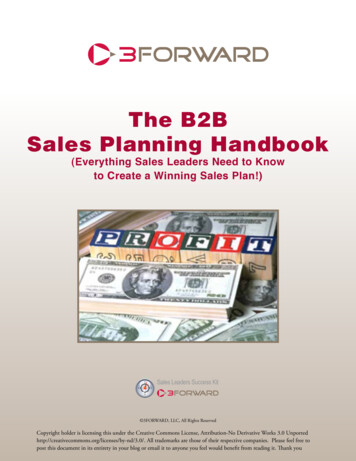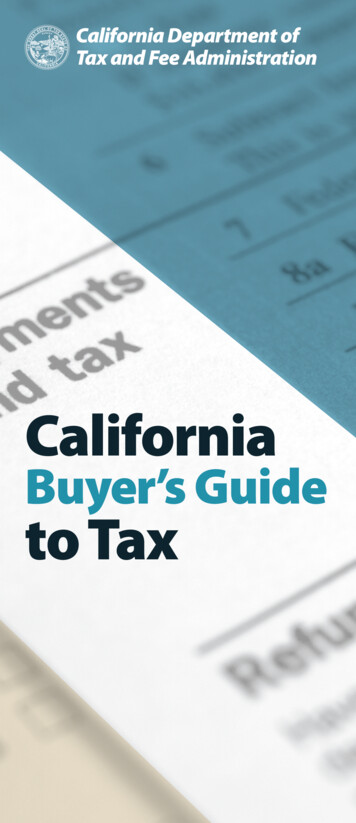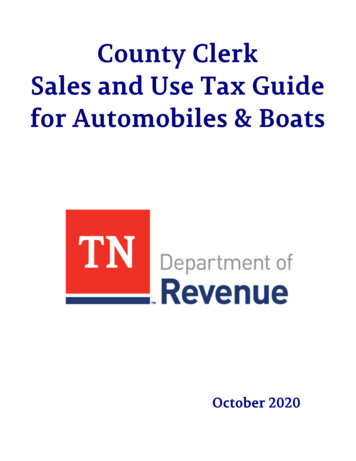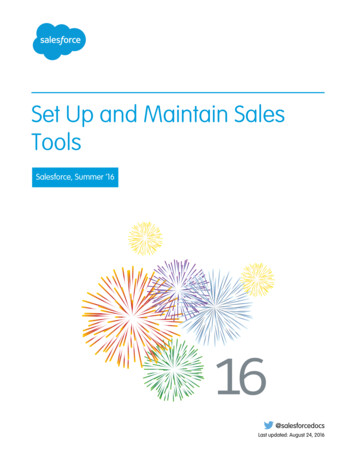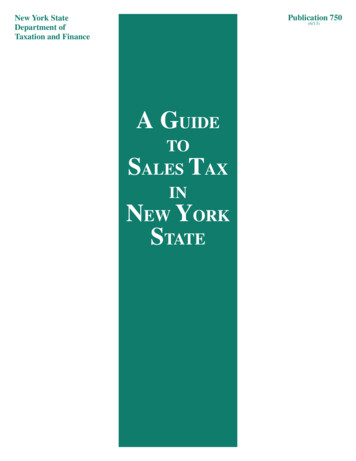
Transcription
Publication 750New York StateDepartment ofTaxation and Finance(6/13)A GUIDETOSALES TAXINNEW YORKSTATE
Publication 750(6/13)About this publicationThis publication is a comprehensive guide to New York State and local sales and use taxes for businesses thatsell taxable tangible personal property, perform taxable services, receive admission charges, or operate a hotelor motel, and restaurants, taverns, or other establishments that sell food and drink.For basic, easy-to-understand explanations of particular sales tax topics, see our sales tax bulletins, available onthe Tax Department’s Web site at www.tax.ny.gov. We have issued a number of these sales tax bulletins and wecontinue to add new bulletins on a regular basis.It is the department’s goal that all taxpayers meet their sales tax obligations and pay the correct amount of taxdue. If your business makes sales of property or services that are subject to sales tax, it must register for salestax purposes and obtain a Certificate of Authority. You should thoroughly read all the information contained inthis publication so that you become aware of your obligations in regard to sales tax. If you fail to fulfill yourobligations under the Sales Tax Law, you could be subject to penalties and/or charged with a crime. Some ofthese obligations include, but are not limited to: registering for sales tax purposes and displaying a Certificate of Authority (see page 14, How to obtainyour Certificate of Authority) and Tax Bulletin How to Register for New York State Sales Tax(TB-ST-360); collecting the proper amount of sales tax from customers (see page 25, Calculating and stating the salestax) and Tax Bulletin Taxable Receipts-How Discounts, Trade-ins and Additional Charges Affect SalesTax (TB-ST-860); issuing and accepting properly-completed sales tax exemption certificates (see page 31, Exemptioncertificates) and Tax Bulletin Exemption Certificates for Sales Tax (TB-ST-240); maintaining records of sales and purchases in an orderly and adequate manner (see Part III, Recordkeeping) and Tax Bulletin Recordkeeping Requirements for Sales Tax Vendors (TB-ST-770); filing sales tax returns and remitting any sales tax due in a timely manner as a trustee for the state (seePart IV, Filing your sales tax return) and Tax Bulletin Filing Requirements for Sales and Use Tax Returns(TB-ST-275); assuming personal liability for the payment of sales tax by certain responsible persons of a business; and providing notice to the department 20 days prior to purchasing or acquiring business assets from a salestax vendor, other than in the ordinary course of business (see Part VI, Purchasing or acquiring a businessor its assets: Caution).Publication 900, Important Information for Business Owners, provides additional information on yourresponsibilities under the Sales Tax Law.3
Publication 750(6/13)Obligation to register for sales tax purposesYou are required to register for sales tax purposes with the Tax Department if the sales you make are subject totax. You must be registered to issue or accept most exemption certificates and documents. The informationcontained in this publication is intended to help you determine if you are required to register for sales taxpurposes.As used in this publication and for purposes of the Tax Department’s registration rules, the term vendorincludes persons required to collect sales tax on sales and transactions described in Part II, Making sales. Also,when used in this publication, the terms sales, purchases, taxable sales, and taxable purchases, include, but arenot limited to, where appropriate, the sale or purchase of the following: tangible personal property, certainservices, rentals of hotel and motel rooms, admissions to places of amusement, and dues paid to social orathletic clubs.Note: See page 20, Sales by New York and United States governmental entities and certain exemptorganizations, for information relating to sales by governmental entities and certain exempt organizations.Obligation to collect and remit taxOnce you are registered for sales tax purposes, you are responsible for collecting and remitting both state andlocal sales taxes to the Tax Department, along with any use tax you may owe. If your business is an entity suchas a corporation or a partnership, the responsibility for collecting and remitting sales tax extends to theresponsible persons of the business. Therefore, certain owners, officers, directors, employees, partners ormembers (responsible persons) of a business can be held personally liable for the tax owed by the business. Astrustees for the state, a business and its responsible persons have an obligation to remit any sales tax that is duewith timely filed sales tax returns. Failure to collect and remit sales tax can result in the imposition of penaltiesand interest. (See page 37, Filing your sales tax return.)RecordkeepingYou must keep detailed records of every sale, the amount paid, charged, or due on the transaction, and the salestax that is due, if any. Keeping good records of your business operation will help you prepare accurate andcomplete sales tax returns. (See Part III, Recordkeeping and Tax Bulletin Recordkeeping Requirements for SalesTax Vendors (TB-ST-770).)In addition to being required to register for sales tax purposes, you may also be subject to registration,collection, or payment requirements for other taxes. For a more detailed description of these taxes, seePublication 20, New York State Tax Guide For New Businesses.Additional informationThe department continues to have available many general and industry-specific sales tax publications andtechnical service memoranda that provide additional detailed information on various sales tax topics. You canobtain any tax bulletin, publication, memorandum (TSB-M) or document referenced in this publication byvisiting the Tax Department’s Web site or by contacting us directly. The department’s Web site also allows youto receive timely notification of sales tax changes by subscribing to our e-mail subscription service.4
Publication 750(6/13)If you have any questions about sales and use tax, you may contact us by using the information provided in theNeed help? section on the back cover of this publication.Note: A publication is an informational document that addresses a particular topic of interest to taxpayers.Subsequent changes in the law and regulations, judicial decisions, Tax Appeals Tribunal decisions, orchanges in department policies could affect the validity of the information contained in a publication.Publications are updated regularly and are accurate on the date issued.5
Publication 750(6/13)6
Publication 750(6/13)Table of contentsPagePart I – RegistrationWho must be registered for sales tax purposes .9Rules for out-of-state businesses .10About your Certificate of Authority .11Types of Certificates of Authority.12How to obtain your Certificate of Authority .14Denial of a Certificate of Authority .14Taxpayers’ Bill of Rights .15Registration rules for farmers .15Registration rules for contractors .15Registration rules for manufacturers .16Part II – Making salesTaxable sales .16Additional sales taxes and fees you may be required to collect .22Sales taxes imposed only within New York City .23Sales taxes imposed by certain school districts .25Calculating and stating the sales tax .25Exempt sales .29Exempt sales – exemption certificate required .30Exemption certificates .31Exempt purchasers .32Taxable business purchases .33Part III – RecordkeepingRecordkeeping rules .35Part IV – Filing your sales tax returnFiling requirements .37Completing your sales and use tax return .40Part V – Show and entertainment promotersShow promoters .41Entertainment promoters .43Part VI – Purchasing or acquiring a business or its assets: CautionBulk sales transactions .45Appendix – List of common sales tax forms .48Need help . Back cover7
Publication 750(6/13)8
Publication 750(6/13)Part I – RegistrationWho must be registered for sales tax purposesYou must beregistered for salestax purposes withthe Tax Departmentif you will be sellingtangible personalproperty or serviceson which you arerequired to collectsales taxIf you will be selling property or services in New York State that are subjectto sales tax, you may be required to collect the sales tax from the person towhom you make the sale. (The discussion on page 16 under Taxable saleswill help you determine whether the sales you make are subject to sales tax.)In general, the sales tax you must collect and remit is computed using thecombined state and local rate in effect in the locality where you deliver thetaxable product or service to the customer. See pages 26 through 29 of thispublication for information on the special rules for the calculation andcollection of tax on sales of motor fuels, alternative fuels, motor vehicles,and certain boats. If you must collect sales tax on your sales, then you mustregister for sales tax purposes with the Tax Department and obtain aCertificate of Authority (see page 11 and Tax Bulletin How to Register forNew York State Sales Tax (TB-ST-360)).You must also beregistered for salestax purposes to issueor accept mostNew York State salestax exemptioncertificatesYou must also be registered for sales tax purposes to issue or accept mostNew York State sales tax exemption documents. For example, even thoughwholesalers may never collect sales tax because all of their purchases andsales are for resale (and, therefore, are eligible for exemption from sales tax),they must still be registered to legally issue and accept most exemptiondocuments.If you engage inbusiness withoutobtaining a validCertificate ofAuthority, you will besubject to asubstantial penaltyIf you are required to register for sales tax purposes but fail to do so and youengage in business without having obtained a valid Certificate of Authority,you will be subject to a penalty. The penalty is up to 500 for the first daybusiness is conducted without having obtained a valid Certificate ofAuthority, plus up to 200 per day for each day thereafter. The maximumpenalty for engaging in business without obtaining a valid Certificate ofAuthority is 10,000. See Tax Bulletin Sales and Use Tax Penalties(TB-ST-805).If you are changingyour organizationalstructure, you mustregister for sales taxpurposes as a newbusinessIf you change your organizational structure (for example, from a soleproprietorship to a corporation, a limited liability company, or apartnership), the new organization must register for sales tax purposes andobtain a new Certificate of Authority. The new business must obtain its ownCertificate of Authority before it begins operating. You must also file a finalreturn for your existing business and surrender the Certificate of Authoritythat was issued to the existing business. See Tax Bulletin Amending orSurrendering a Certificate of Authority (TB-ST-25) and Tax Bulletin FilingPeriod Indicators on Final Sales Tax Returns (TB-ST-270).For additional information on who must be registered for sales tax purposes,see Tax Bulletin Do I Need to Register for Sales Tax? (TB-ST-175).9
Publication 750(6/13)Purchasing,transferring, orassigning businessassetsIf you are purchasing, transferring, or assigning either part or all of the assetsof an existing business, there are specific rules that apply to the transaction(see Part VI on page 45).Rules for out-of-state businessesEven though you arelocated in anotherstate, if you havecustomers inNew York State, youmay be considered avendor forNew York State salestax purposesEven though you are located outside of New York State, if you havecustomers in New York State, and you have sufficient connection withNew York State, you may be required to register for New York State andlocal sales tax purposes. For example, if you are located outside New YorkState, make sales of taxable products to persons within New York State, andregularly deliver the products in your trucks to your New York Statecustomers, you have sufficient connection with New York State and mustregister for sales tax purposes and collect and remit sales tax. You must alsoregister if you solicit sales of taxable products or services throughemployees, salespersons, independent agents, or service representativeslocated in, or who enter New York State.If the only connection you have with New York State is the delivery of yourproducts into the state by the U.S. Postal Service or common carrier, you arenot required to register or collect sales tax. Thus, some out-of-statebusinesses (including some mail order companies) may not have sufficientconnection with New York State to be required to collect and remit sales tax.However, out-of-state sellers that make taxable sales of tangible personalproperty or services in New York are presumed to be sales tax vendors undercertain conditions where they have agreements with New York residents tocompensate them for referring potential customers to the seller. Also, undercertain conditions, sellers of tangible personal property or services locatedoutside of New York that have an affiliate located in New York may also berequired to register to collect and remit sales tax. For more detailedinformation, see TSB-M-08(3)S, New Presumption Applicable to Definitionof Sales Tax Vendor, TSB-M-08(3.1)S, Additional Information on HowSellers May Rebut the New Presumption Applicable to the Definition ofSales Tax Vendor as Described in TSB-M-08(3)S, and TSB-M-09(3)S,Definition of a Sales Tax Vendor is Expanded to Include Out-of-State Sellerswith Related Businesses in New York State.Although, as an out-of-state business, you may not be required to collectsales tax from your customers in New York State, your customers are stillresponsible for the payment of sales or use tax on their purchases. The usetax complements the sales tax. An example of when use tax applies is whena New York State resident purchases taxable products or services outside ofNew York State and then brings them or has them brought into New York10
Publication 750(6/13)State for use here. For more information, see Publication 774, Purchaser’sObligations to Pay Sales and Use Taxes Directly to the Tax Department:Questions and Answers, and Tax Bulletin Use Tax For Businesses(TB-ST-910).Although you may not have sufficient connection with New York State torequire you to be registered, you may voluntarily register for sales taxpurposes to collect and remit the sales tax that is otherwise due from thepurchaser. You will then have the same obligations as vendors that arerequired to register with the Tax Department.If you are required to register for sales tax purposes, or if you voluntarilyregister, you must collect sales tax on all taxable sales delivered by you, orfor you, to the purchaser, or the purchaser’s designee, in this state. The taxdue is the combined state and local rate in effect in the locality where thetaxable product or service is delivered.For more information on registration rules for out-of-state businesses, seeTax Bulletin Do I Need to Register for Sales Tax? (TB-ST-175).About your Certificate of AuthorityYour Certificate ofAuthority authorizesyou to collect salestax on your taxablesales and to issue andaccept certainNew York State salestax exemptioncertificatesYour Certificate of Authority authorizes you to collect sales tax on yourtaxable sales and to issue and accept certain New York State sales taxexemption certificates. You cannot legally make taxable sales or issue oraccept many exemption documents until you have received your Certificateof Authority. Exemption certificates are forms that are filled out by apurchaser and given to the seller, so that the seller has a record of why salestax was not required to be collected on the sale to which the certificaterelates.You mustprominently displayyour Certificate ofAuthority at yourplace of businessYou must prominently display your Certificate of Authority at your place ofbusiness. If you have no permanent physical location, you can attach it toyour truck, cart, wagon, stand, or other vehicle or facility from which youconduct business. You are subject to a 50 penalty if you fail to properlydisplay your Certificate of Authority. See Tax Bulletin Sales and Use TaxPenalties (TB-ST-805).Once you receive your Certificate of Authority, you are considered to be inbusiness for sales tax purposes even if you never make a sale or never openthe doors of your establishment. Therefore, it is important that you file yoursales tax returns on time, even if you did not have any taxable sales duringthe reporting period, to avoid being subject to penalties for not filing.If you have more than one place of business, you must display a Certificateof Authority at each place of business. You may not use photocopies of aCertificate of Authority but may request a separate certificate for each11
Publication 750(6/13)location from the Tax Department. See How to obtain your Certificate ofAuthority on page 14 for more information on applying for a Certificate ofAuthority when you have multiple business locations.If you have already received your Certificate of Authority, but need aduplicate copy because the original was lost or destroyed, you may contactus and request a duplicate original.Your Certificate ofAuthority is nottransferableYour Certificate of Authority is not transferable or assignable. If you buy anongoing business, you must apply for your own certificate. (See Part VI onpage 45 for additional information on the rules regarding the purchase,transfer, or assignment of a business.) If you sell, transfer, or assign yourbusiness or cease doing business, you must surrender your Certificate ofAuthority to the Tax Department.Although your Certificate of Authority is not transferable or assignable, itmay be amended to account for changes in the address of the business orbusiness name. If you need to change your sales tax address you can do soby visiting our Web site or by contacting us directly. You can also useForm DTF-96, Report of Address Change for Business Tax Accounts.Form DTF-95, Business Tax Account Update, can be used to provide the TaxDepartment with information regarding address changes, telephone numberchanges, and certain changes in business activities. Some changes inbusiness activities may be made by contacting us directly.If you cease doingbusinessIf you cease doing business, your Certificate of Authority must be returnedto the department along with a final sales tax return for the business within20 days of terminating the business. Special rules apply if you Web File afinal sales tax return. Visit the Online Services section of our Web site formore information. Also, see Tax Bulletin Filing a Final Sales Tax Return(TB-ST-265).Types of Certificates of AuthorityThe Tax Departmentissues two types ofCertificates ofAuthority for salestax purposesThe Tax Department issues two types of Certificates of Authority for salestax purposes: regular, and temporary.The type of Certificate of Authority you apply for should be based on theanticipated duration of your business activities.Note: The department no longer issues the Certificate of Authority for Showand Entertainment Vendors. If you make sales at shows or entertainmentevents, such as flea markets, craft shows, antique shows, fairs, and similar12
Publication 750(6/13)shows, you should apply for a regular Certificate of Authority.See TSB-M-08(13)S, Changes Regarding the Issuance of Certificates ofAuthority to Show and Entertainment Vendors, for more information.Regular Certificate ofAuthorityYou should apply for a regular Certificate of Authority if you will be makingongoing taxable sales from your home, a shop, a store, a cart, a stand, or anyother facility or facilities from which you regularly conduct your business. Itdoes not matter whether you own or rent the facility.You must apply for a regular Certificate of Authority at least 20 daysbefore you begin operating your business in New York State. See How toobtain your Certificate of Authority on page 14 and Tax Bulletin How ToRegister for New York State Sales Tax (TB-ST-360).TemporaryCertificate ofAuthorityYou may apply for a temporary Certificate of Authority if you expect tomake taxable sales in New York State for no more than two consecutivequarterly sales tax periods in any 12-month period. In determining whetheryou meet this requirement, keep in mind that the sales tax quarters are:March 1 through May 31, June 1 through August 31, September 1 throughNovember 30, and December 1 through February 28 (February 29 in a leapyear).Show and entertainment vendors may not apply for a temporary Certificateof Authority; they must apply for a regular Certificate of Authority.Even if you are eligible to obtain a temporary Certificate of Authority, it maybe to your benefit to apply for a regular Certificate of Authority. That isbecause a temporary Certificate of Authority is good only for the twoconsecutive quarterly sales tax periods listed on your application and onyour temporary Certificate of Authority. In addition, if you operate the samebusiness or another business during the next 12-month period, you mustapply for a new temporary Certificate of Authority at least 20 days beforeyou resume doing business.Example: You sell Christmas trees in November and December, andyour taxable sales consist only of sales during this period. Accordingly,you are eligible to apply for a temporary Certificate of Authority.However, if you intend to conduct this type of business activity everyyear, you may wish to apply for a regular Certificate of Authority. Thiscould be to your benefit because you would not have to apply every yearfor a new temporary Certificate of Authority, as the regular Certificateof Authority would continue to be in effect until you indicate that you areno longer doing business by filing a final return. However, once youreceive a regular Certificate of Authority you must file sales and use taxreturns even if you have no sales tax liability. Also, even if you file afinal return, and subsequently change your plans, you may apply forreactivation of your regular Certificate of Authority simply bycontacting us directly (as long as it is within one year of deactivation).13
Publication 750(6/13)Example: You have no consistent year-to-year sales activity inNew York State. However, you intend to sell costume jewelry from akiosk in the common area of a mall from October through December.This will be your only business activity in New York State this year, andyou do not intend to sell in New York State next year. You may apply fora temporary Certificate of Authority.Example: You intend to sell crafts at a farmers’ market for sevenmonths, from the beginning of April through the end of October. Thisseven-month period covers three consecutive quarterly sales tax periods:March through May, June through August, and September throughNovember. You may not apply for a temporary Certificate of Authority.You must apply for a regular Certificate of Authority.If you qualify to apply for a temporary Certificate of Authority, you mustapply for it at least 20 days before you begin operating your business.(See How to obtain your Certificate of Authority, below.)How to obtain your Certificate of AuthorityYou must apply for aCertificate ofAuthority at least 20days before youbegin businessYou must apply for a Certificate of Authority at least 20 days before youbegin operating your business. Vendors should apply online by visiting theNYS License Center.Vendors that cannot apply online must contact the Sales Tax InformationCenter. See the Need help? section on the back cover of this publication.The Tax Department will review your completed application. If yourapplication is approved, we will mail you a Certificate of Authority. Youcannot legally make taxable sales or issue or accept most exemptioncertificates until you have received your Certificate of Authority. If youlisted several places of business on your application, the Tax Departmentwill provide you with a separate Certificate of Authority for each location.Denial of a Certificate of AuthorityThe Tax Departmentmay deny yourrequest for aCertificate ofAuthorityThe Tax Department may deny your request for a Certificate of Authorityunder certain circumstances. For example, if any tax imposed under the TaxLaw has been finally determined to be due from you and that tax liability hasnot been paid, your application for a Certificate of Authority may be denied.Remember that you cannot legally make taxable sales or issue or acceptmost New York State exemption certificates until you receive a Certificateof Authority. See page 9 for information regarding the penalties imposed forengaging in business without first receiving a Certificate of Authority.14
Publication 750(6/13)Within 30 days of themailing of the noticethat your applicationfor a Certificate ofAuthority has beendenied, you may fileeither a request for aconference, or apetition for a hearingIf your timely and complete application for a Certificate of Authority isdenied, we will send you a Notice of Proposed Refusal to Register bycertified mail within five days of the date we receive your application. TheNotice of Proposed Refusal to Register will state the basis for the proposedrefusal. If you believe that the Tax Department has made a mistake, youshould file a request for a conference with the Bureau of Conciliation andMediation Services, or file a petition for a hearing with the Division of TaxAppeals. You must file the application for a conference or hearing within 30days of the mailing of the Notice of Proposed Refusal to Register; otherwiseit becomes final. Once the Notice of Proposed Refusal to Register becomesfinal, you are prohibited from engaging in any business in New York Statefor which a Certificate of Authority is required.Taxpayers’ Bill of RightsNew York State has a Taxpayers’ Bill of Rights that enhances and formalizesyour rights as a New York State taxpayer. In part, the Bill of Rights requiresthe Tax Department to advise you, in writing, of your rights to appeal adepartmental decision. For more information on your rights, seePublication 131, Your Rights and Obligations Under the Tax Law, or contactus.Registration rules for farmersFarmers are notrequired to registerfor sales taxpurposes unless theymake sales that aresubject to sales taxA farmer is not required to register for sales tax purposes if the only
Sep 01, 2008 · Additional information . The department continues to have available many general and industry-specific sales tax publications and technical service memoranda that provide additional detailed information on various sales tax topics. You can obtain any tax bulletin, publication, memoran
